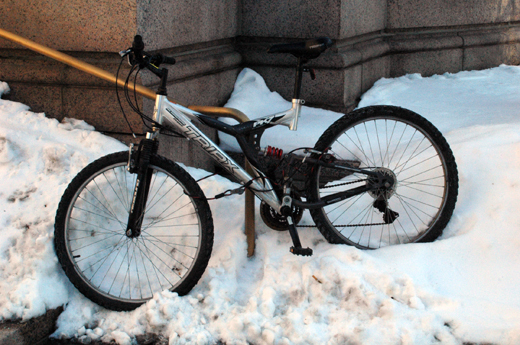An ordinance that I helped work on through feedback, public testimony, and lobbying has made it through it's last major hurdle before coming up before City Council. Although this ordinance only provides for parking in garages, it is an important baby step in the direction of including bicycling in future infrastructure considerations and development. What's next? I'm working on a comprehensive package of bicycle safety ordinances modeled after Chicago's.
Cincinnati Planning Commission approves new bicycle parking requirements
Soapbox, 2/23/2010
Cincinnati's Planning Commission has just approved a new bicycle parking ordinance that will require all new or expanded parking garages to provide bicycle parking.
The way that the ordinance is written now would require new or expanded parking garages to provide one bicycle parking space for every 20 motor vehicle spaces. This ratio is comparable to other cities across the nation that have recently implemented similar ordinances including Portland, New York City, Charlotte, Cleveland, San Francisco, Kansas City and Denver.

"Surveys by the
Department of Transportation & Engineering (DOTE) have found that the lack of secure, weather-protected bicycle parking facilities is a leading factor preventing people from cycling to work," said Melissa McVay, City Planner with the DOTE.
Should a parking garage fail to supply the necessary bicycle parking, the City can refuse to issue or renew their license. In the instance of very large parking garages, there will be a limit of 24 total bicycle parking spaces that need to be provided.
The ordinance also specifies that the bicycle parking space shall be located inside the parking garage and in an area that is protected from the weather. Additionally, each of the bicycle parking spaces will have to be equipped with a bicycle locker; securely anchored floor, wall or ceiling rack; or some other similarly designed system for securing the bicycle.
"I think it's really exciting that Cincinnati is going to be the first city in the region to require bicycle parking in garages," said McVay. "But, it is important to remember that this legislation is just one of many steps that the City will ultimately take to make cycling more convenient."
McVay went on to say that the City is currently working with the
Cincinnati Center City Development Corporation (3CDC) to install bicycle parking at Fountain Square while they also work on retrofits to several City-owned parking garages to meet the new standard.
In unrelated bicycle parking news, construction is currently underway on the new Bike Center at the
Central Riverfront Park that will include lockers, repair facility, showers and connection to the riverfront trail system. And the City's first on-street bicycle parking will be installed this April in Northside where one motor vehicle space will be replaced by an on-street bicycle parking corral with 12 bicycle parking spots.
Writer:
Randy A. SimesPhotography by David De BolStay connected by following Randy on Twitter
@UrbanCincy
 "Surveys by the
"Surveys by the